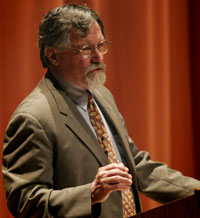Classics still relevant to modern America
Classicist says ancient values shape founding of the United States

Andrew RIggs / The Collegian
Professor E. Christian Kopff from the University of Colorado at Boulder told a standing-room only crowd that the classical world retains importance today for the United States. |
By Bradley Hart
The Collegian
The works of ancient Greece and Rome continue to be relevant to the United States today, just as they were during the founding of the American republic, a packed auditorium was told Thursday night.
E. Christian Kopff, professor of classics at the University of Colorado in Boulder, addressed a full house of students, professors and members of the public, arguing that material from the classical world played a great role in the shaping of the early American Republic – and remains important today.
“There are aspects of our founding that are still alive and vital to this day that come from the ancient world,” Kopff said.
Among those aspects that remain important, Kopff said, are the basic foundations of the American system of government that, he argued, were largely derived from the ancient Roman Republic and specifically the works of Livy.
Among those ideas, Kopff said, was the notion of checks and balances and a bicameral legislature.
Kopff argued that many 18th century authors were highly influenced by the classical education system that was available for those who could afford it.
He said many of the documents dating from the period show the unmistakable influence of classical languages in terms of vocabulary and even the use of classical analogies to describe contemporary individuals.
“If we want to think like the founders we need to know at least a little Latin,” Kopff said.
Kopff also argued that many of the general ideas of the ancient world, including the idea of tyranny that played a role in the shaping of the American Revolution, were borrowed from ancient sources, usually those using Julius Caesar as an example of a tyrant.
Furthermore, Kopff stated, the tradition of peacefully leaving power at the end of one’s term of office largely dates back to the ancient figure of Cincinnatus, a Roman citizen who was given the powers of dictator during a period of crisis, only to resign when the threat had passed.
Kopff likened this to the American presidential tradition, dating back to George Washington, of leaving office after two terms.
That tradition was codified in a Constitutional amendment in 1951 following the four terms of Franklin Roosevelt.
Kopff concluded that while there is debate today over the influence over the classical world on the American founders there was none in the 18th century world – and no question about the importance of the classical world.
Kopff’s lecture was the annual the Phebe McClatchy Conley Lecture, sponsored by the department of modern and classical languages and literatures in conjunction with the classical studies department.
Prior to the lecture, professor Bruce Thornton made a brief remembrance of former Arts and Humanities Dean Luis Costa, who died of cancer in late August.
Comment on this story in the News forum >>
|

